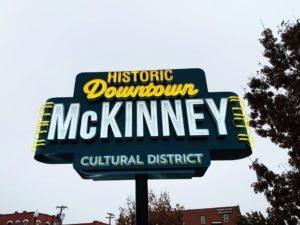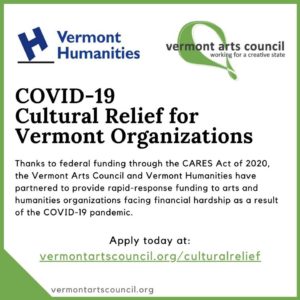May 7, 2020
Washington, Texas, South Carolina, Vermont: State CARES Act Arts Programs
The Coronavirus Aid, Relief, and Economic Security (CARES) Act included $75 million in COVID-19 relief funds to be distributed through the National Endowment for the Arts. To achieve broad and inclusive access to federal funds, Congress requires 40% of the Arts Endowment’s grant budget to be allocated to state arts agencies and regional arts organizations—a stipulation that also applies to CARES Act resources. These funds will be regranted by states and regions to preserve jobs and address facilities costs.
State arts agencies are employing a variety of mechanisms to make CARES Act relief available to the arts field as quickly as possible. Some states are launching new grant programs, some are distributing the dollars through existing grant categories and others are adopting a blend of strategies. Special consideration is being given to diversity and equity in how funds are distributed. Each state’s solution is unique, with varying eligibility requirements and award amounts. Washington, Texas, South Carolina and Vermont offer illustrative and distinctive approaches.
Washington: Rapid-Response Funding

Traditional folkloric dancers at El Centro de la Raza’s Dia de Los Muertos celebration. Photo courtesy of El Centro de la Raza, Seattle
ArtsWA is providing rapid-response funding to arts groups that are facing financial hardship due to the economic impacts of COVID-19. The agency is inviting applications from all 501(c)(3) nonprofit arts organizations impacted by the COVID-19 pandemic as well as arts groups affiliated with tribal organizations and fiscally sponsored organizations having the arts, culture or heritage as a primary mission focus. Organizations can apply for up to $5,000. Funding priorities include:
- organizations facing significant financial hardship related to COVID-19 (hardships include temporary or permanent closure, loss of paid staff, loss of venue or workspace, and significant loss of revenue);
- organizations impacted by COVID-19 that serve and are led by members of historically under-resourced communities, including people of color, people who identify as LGBTQ+, people who live in rural areas, people with disabilities, people who identify as immigrants or refugees, and people whose first language is not English.
Applications are being accepted on an ongoing basis until May 31. To ensure the maximum spread of limited public funding, ArtsWA will only approve grants to organizations that do not receive CARES Act grants directly from the National Endowment for the Arts. ArtsWA is accepting applications from all eligible organizations, but groups submitting both state and federal applications will need to wait to learn if their Arts Endowment award has been declined before their ArtsWA grant is released. Learn more about ArtsWA’s CARES Act Relief Grants from Grants Manger Miguel Guillén.
Texas: Disseminating CARES Act Funding

Cultural Districts Project Support grantees are eligible for TCA’s CARES Act Funding. Photo by Aaron Werner
The challenge faced by the Texas Commission on the Arts (TCA) is to deploy finite CARES Act funds across one of the largest states in the union, with a population of more than 29 million. To expedite relief while also reaching a diversity of communities and organizations, TCA is devoting the funds to existing grantees from three different grant categories: Arts Create, Arts Respond Project Support and Cultural Districts Project Support.
These grantees represent more than 500 cultural organizations from about 90 different Texas communities. By including project support and designated cultural district grantees in the eligibility pool, TCA is ensuring that CARES Act funding will reach organizations of varying sizes, from the very small to the very large, across Texas. Funds also will reach grantees with a track record of reaching underserved constituents and those working at the intersections of the arts and economic development, social services, health, public safety, and agriculture/natural resources.
Funds are being distributed via amendments to eligible organizations’ current grants—only one amendment per organization if the grantee received TCA support in more than one category. Amendments are expected to be executed in early May, and the equal, noncompetitive award amounts are estimated to be about $1,200. Payments will be completed after the TCA commissioners’ quarterly meeting in early June. Contact TCA Director of Programs & Technology Laura Wiegand for more information.
South Carolina: Arts Emergency Relief Funds

Detail from a new poster by South Carolina artist Amiri Geuka Farris commissioned for a public health campaign to help stop the spread of the coronavirus. Photo by the artist
The South Carolina Arts Commission (SCAC) is regranting its CARES Act allocation through Arts Emergency Relief Funds to arts organizations. The program is open to nonprofit arts organizations and fiscally sponsored arts groups, as well as universities, schools and units of government that are current recipients of SCAC operating support grants. Funding priority will be given to organizations:
- in federally designated Promise Zone counties
- in SCAC’s Opportunity Initiative Counties (14 counties identified by the Arts Commission as having received historically lower levels of funding)
- in high-poverty areas (in which 20% or more of population served lives below the poverty line), rural areas or urban clusters (as defined by the U.S. Census Bureau)
- serving special populations, including people with disabilities, populations living in institutions (including hospitals, hospices, assisted living facilities, correctional facilities and homeless shelters), families living on military bases or individuals with limited English proficiency
- completing the Americans for the Arts COVID-19 Economic Impact Survey
Panels will review and recommend CARES Act applications, and will consider documented income losses from COVID-19, the above funding priorities and whether the applicant has access to other sources of relief. Anticipated award amounts are up to $500 for organizations with operating budgets under $75,000 and up to $1,000 for organizations with operating budgets exceeding $75,000. Individual artists also are eligible to apply, although SCAC is using a different mixture of funds (beyond the CARES Act) to support those awards.
These award amounts are for organizations that are not current SCAC operating support grantees. Current SCAC operating support grantees can apply, and will receive a percentage amount of their current operating support based on budget size, without going through a panel process (since this subset of organizations received a prior panel review). For more on SCAC’s arts relief grant strategy, contact South Carolina Arts Commission Deputy Director Ashley Brown.
Vermont: COVID-19 Cultural Relief Grant Program
 The Vermont COVID-19 Cultural Relief Grant Program is a partnership between the Vermont Arts Council and Vermont Humanities. To increase the impact of federal CARES Act support, the two agencies combined forces—and funds—to develop a joint strategy for providing relief to Vermont’s cultural sector. Funding for this program is provided primarily from CARES Act resources provided through the National Endowment for the Arts and the National Endowment for the Humanities.
The Vermont COVID-19 Cultural Relief Grant Program is a partnership between the Vermont Arts Council and Vermont Humanities. To increase the impact of federal CARES Act support, the two agencies combined forces—and funds—to develop a joint strategy for providing relief to Vermont’s cultural sector. Funding for this program is provided primarily from CARES Act resources provided through the National Endowment for the Arts and the National Endowment for the Humanities.
Nonprofit arts and humanities organizations incorporated in the state of Vermont may apply for support if they are facing serious hardship caused by COVID-19. Award amounts will be based on applicants’ budget size and will range from $5,000 to $10,000. Per federal guidelines:
- Awards funded with Vermont Humanities dollars may be used for operating support, humanities programming and fees paid to humanities scholars.
- Awards made with Vermont Arts Council grant funds may be used for salaries (administrative or artistic) as well as facilities costs like rent and utilities.
Geographic diversity will be a key consideration in the distribution of CARES Act grants, to ensure that all regions of the state (rural and urban alike) have access to support. Special consideration will be given to applications from historically marginalized communities, such as indigenous groups and organizations led by or serving people of color, LGBTQ+ people, individuals with disabilities, immigrants, refugees and communities whose first (or only) language is not English. Since its launch, the program has received more than 100 applications from various Vermont based cultural organizations. The majority are from small to medium-sized organizations. To find out more about the Vermont Arts Council’s role in this partnership, contact VAC Senior Program Manager Michele Bailey.
In this Issue
From the President and CEO
State to State
- Washington, Texas, South Carolina, Vermont: State CARES Act Arts Programs
- Colorado, Iowa: Student Engagement during COVID-19
- Indiana, Massachusetts: Stabilizing the Arts during (and after) COVID-19
Legislative Update
The Research Digest
Announcements and Resources
More Notes from NASAA
SubscribeSubscribe
×
To receive information regarding updates to our newslettter. Please fill out the form below.

